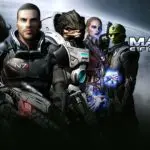Submitted by Elizabeth Rogers
“If Thane is going to be the only scraps that I get, I’ll take it.”
“I’m dying,” is one of the first things Thane Krios says to you in the video game Mass Effect 2. It’s a powerful introduction in a game that’s filled with it, reinforcing Bioware’s ability to create characters that have a lasting impact. It is also the crux of both the problem and the joys that accompany Thane, one of the few chronically ill characters to play a significant role in any video game.
After your player character, Commander Shepard, successfully recruits Thane to join the spaceship, Normandy, you’re able to find out more. From the beginning, Thane is remarkably candid about his lifespan and the problems he faces. Thane is an alien, the lizard-like drell. With a croaking breath, he tells you he suffers from Kepral’s Syndrome, a lung disease that renders them unable to absorb oxygen and ultimately, to breathe at all. There was an instant, startling moment of connection for me. I was born with cystic fibrosis, a life-threatening genetic disorder that fills my lungs and pancreas with thick, sticky mucus.

“Sometimes, it feels as if those of us in the disability community should be grateful for scraps. A character dies, but at least they existed, right? That’s far from the truth…”
Like Thane, there will be a point where my lungs will no longer work. I’ll need a transplant, somewhere down the line. I look at myself and I don’t see even the most remote possibility of an action hero, yet Thane opened new doors. Despite his illness, he could run, kick ass, shoot a gun, and keep up with Commander Shepard. He was soulful and intelligent, but he was far from perfect. He had flaws and nuances. I had never seen myself in a video game before, and suddenly it was right in front of me. I didn’t pull the connection out of thin air. In a forum post, series writer Patrick Weekes stated, “in many ways, the description for Kepral’s Syndrome is similar to the real-life disease cystic fibrosis.” It’s not a one to one recreation, but similar enough that even others with only a layman’s knowledge of the disease could see it.
“I look at myself and I don’t see even the most remote possibility of an action hero, yet Thane opened new doors.”
Unfortunately (spoiler alert), Thane dies at the start of the third game. There’s a lot to be said in the problematic depictions of disabled individuals as doomed to die, and it’s a stereotype he fell into, as much as I disliked it. But even from that, I was able to glean something- he dies fighting, rather than in a hospital bed. While I’d rather he had lived, to see him go out in a show of strength felt like the bare minimum, at the very least. What I appreciated the most, perhaps, was that the Mass Effect writers didn’t give Thane a cure. The ‘cure narrative’- the idea that a disabled person must exist in fiction only to be cured, or that the cure is the ultimate end goal- is insidious and ever-present. Representations of disability are often obfuscated by that. A person in a wheelchair walks again. Someone with a chronic illness suddenly finds a magic pill that renders all their problems moot. In writing in cures, disability is excluded, and people are no longer able to see themselves in those fictional universes.
There was no cure for Thane’s Kepral’s, and I could relate to him all the more.
Sometimes, it feels as if those of us in the disability community should be grateful for scraps. A character dies, but at least they existed, right? That’s far from the truth – we should push for more inclusion and for greater diversity. The gaming industry can and should do better. My feelings on Thane remain mixed. I’m incredibly grateful he wasn’t cured, but I can also acknowledge my anger at his death. It felt as though there were ways he could have continued as a character- treatments given that wouldn’t erase his disease, but help alleviate symptoms. Things that would have given him more screen time, rather than just having him be a brief spark on screen. A writer with cystic fibrosis surely would have created that space for him to exist without death, to be disabled and kicking ass well into the end of the series. The onus of a noble sacrifice shouldn’t have to lie on the shoulders of a disabled character, dying to save our hero. At the same time, if Thane is going to be the scraps that I get, I’ll take it. I can advocate for more while also acknowledging that he’s still all I’ve seen of myself in a video game to date. I can acknowledge that within Thane Krios, there are problems but there is also the joy of recognition.

